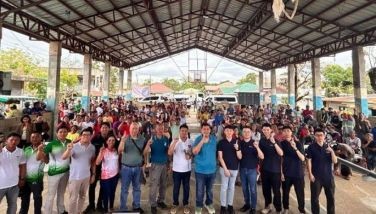Local executives

In her dalliance with her brother’s Senate slate, Sen. Imee Marcos made a noteworthy observation: ordinary Filipino voters seem to have no idea about what senators are mandated to do.
It can help explain the results of surveys in the Senate race, which have caused dismay among those hoping for an informed vote.
Meeting last week with a small group of journalists, Marcos noted that people know what local government officials do – the governor, mayor, vice mayor, their councilors and even the barangay officials.
People also have a good idea of what the president does – an expanded version, being the chief executive, of what local executives do, which is to provide the basic services expected of a government. The same goes for congressmen, who look after the needs of their local constituencies.
When it comes to senators, however, there is confusion about their mandate, Marcos says, with people thinking senators are also like local executives who have a direct hand in the delivery of services.
While Senator Imee didn’t say it aloud, the surveys reflect this perspective, with those who are better qualified to craft laws and exercise oversight functions being trumped by... never mind.
With many people having little understanding of the role of senators, personalities in entertainment, media and sports also have an edge in name recall and voter preferences for the Senate.
Voter attention span has become much shorter, Senator Imee said, with people not interested in campaign spiels. Apart from the challenge of wooing votes by explaining one’s campaign platform, she said it can be tough to keep the audience from leaving or tuning out after a candidate who is an entertainment or media personality has spoken.
* * *
For both national and local races, a common confusion for voters is the source of the numerous state-funded ayuda or aid programs, for which politicians fall all over themselves to take credit at taxpayers’ expense.
Among those in the so-called Magic 12 in the Senate race are candidates linked to such aid or are seen to provide quick action on the problems of ordinary people.
This voter preference is evident as well in the party-list system, whose nature also confounds many people. The party-list group topping the surveys is the 4Ps – not the conditional cash transfer program, but “Pagtibayin at Palaguin ang Pangkabuhayang Pilipino.”
The Commission on Elections, which has banned candidates from taking credit whether in person or through campaign materials for all state-funded ayuda programs, should have banned the use of this name for the party list, which takes undue credit for the benefits provided under the Pantawid Pamilyang Pilipino Program or 4Ps.
The Comelec, unfortunately for our country, is a paper tiger in many aspects. In the next elections, will it also allow party-list groups with the acronym AICS, AKAP and TUPAD?
One Senate bet has already staked personal ownership of the Malasakit health centers, which is under AICS or the Assistance for Individuals in Crisis Situations – a program administered, like AKAP and 4Ps, by the Department of Social Welfare and Development. The Malasakit centers give politicians a say in the identification of beneficiaries of tax-funded health assistance, unlike the depoliticized services under the Philippine Health Insurance Corp., whose subsidy for 2025 was scrapped by Congress.
Allowing a party-list to run under 4Ps is even more dismaying because two of its nominees are members of Congress: House minority leader Marcelino Libanan and assistant minority leader JC Abalos.
Congress slashed a hefty P50 billion from the 4Ps for this year and instead realigned billions to the pork barrel and unconditional ayuda programs including one that was not even in the National Expenditure Program proposed by the executive, the AKAP or Ayuda para sa Kapos ang Kita Program, which was allotted P26 billion.
* * *
Voters can be more discerning in their choices when it comes to the local races, understanding the role particularly of the mayor in garbage collection and overall cleanliness, the quality of roads and street lighting, provision of health care and education as well as ease of doing business.
In local races, national renown is no guarantee of victory. Many movie stars and even Manny Pacquiao have lost in their local bids.
There are also local government officials who have enjoyed reelection because of exemplary performance – not in the movies, TV or sports, but in doing their job. Their cities or towns are progressive and prosperity is relatively equitable.
The Senate used to be a springboard for the presidency. But this was when the chamber wasn’t packed with buffoons, ex-cons, epal masters and snake oil salesmen.
With public dismay over most of those landing in the Senate Magic 12 (plus the incumbents), OCTA Research head Ranjit Rye is not ruling out the possibility that the next president of the republic could again come from the ranks of local executives.
* * *
With the official start of the local campaign period, the Comelec at least has gained full jurisdiction over all candidates in the conduct of campaigns. It can dangle the threat of disqualification over violators of campaign rules.
As of Friday night, all the ugly campaign materials that had polluted my daily route to work had mercifully disappeared, but only along the major thoroughfares.
Along the side streets, all the garbage remained as of the weekend, posted defiantly on electric posts, fences, trees and walls of government buildings and suspended from utility wires.
The Comelec and Metropolitan Manila Development Authority can’t do it alone; the Comelec has appealed to local government units to lead in dismantling campaign materials that are posted illegally.
A problem in many areas, unfortunately, is that the local officials themselves who are up for election are leading in violating the rules.
Voters should realize that politicians who have no compunctions about breaking campaign rules will have no compunction about committing greater violations in case they win.
If voters don’t even know the job description of a senator, however, they might not recognize a campaign rule violation even when it stares them in the face.
Or worse, they will recognize it and say, “who cares?”
- Latest
- Trending
























